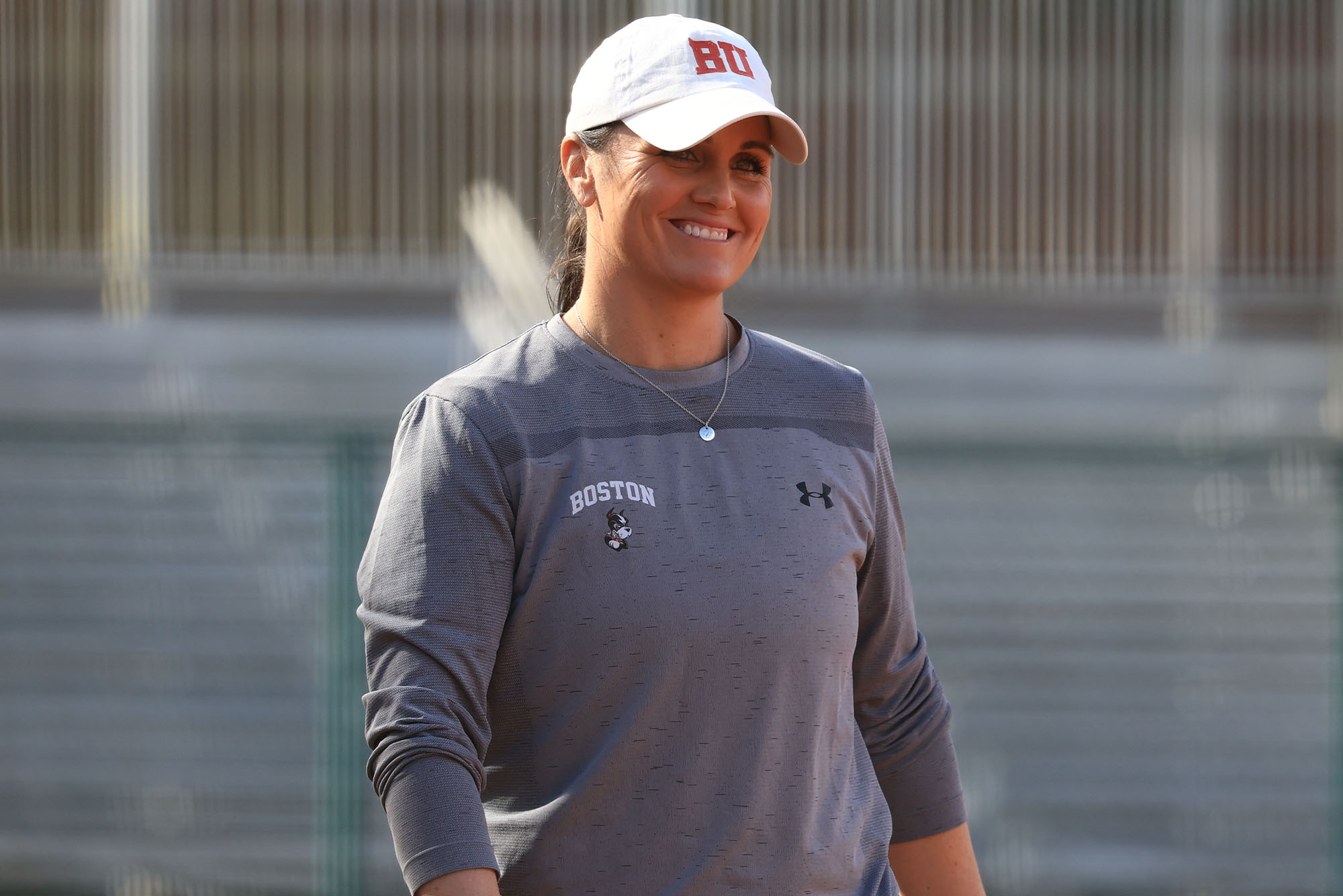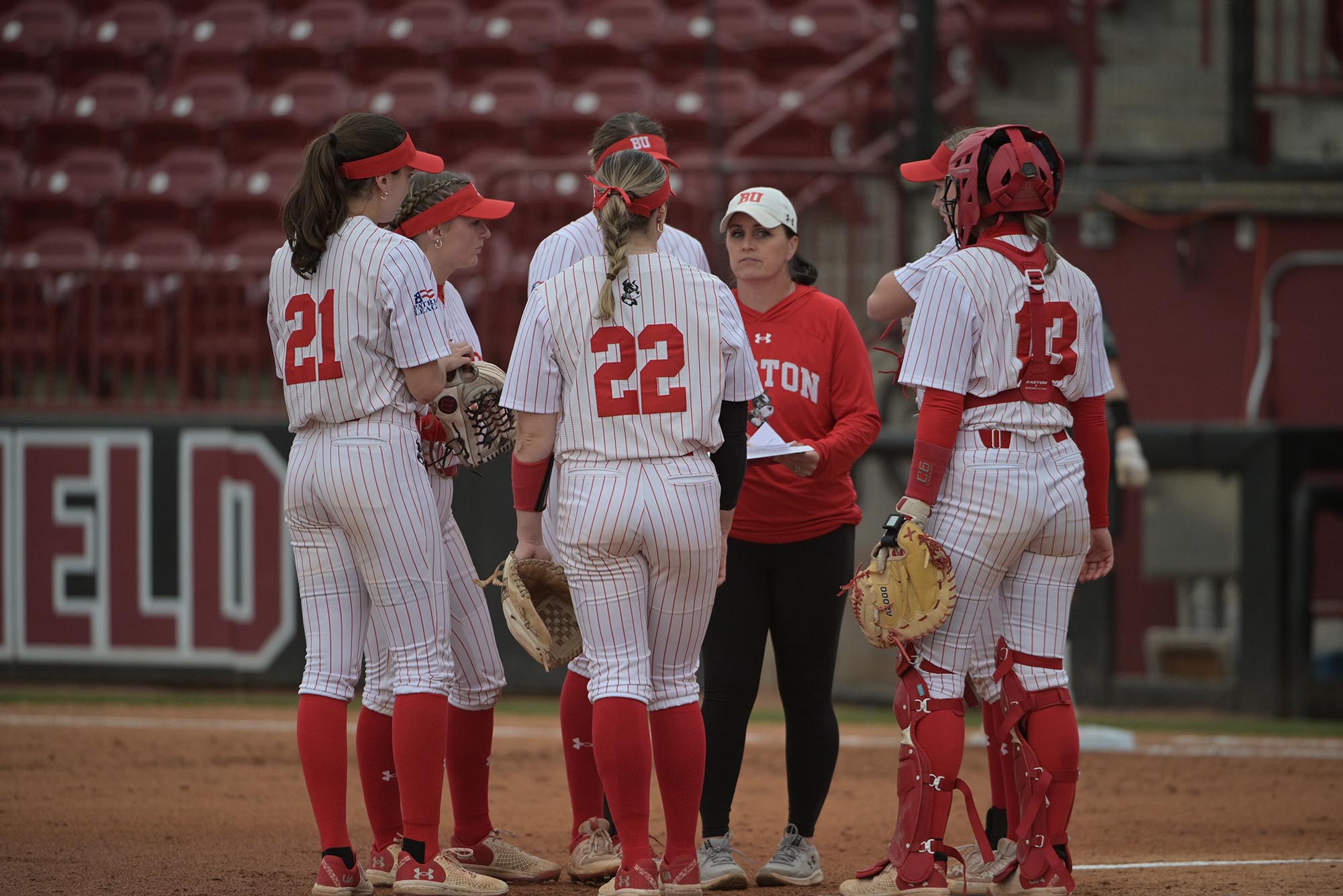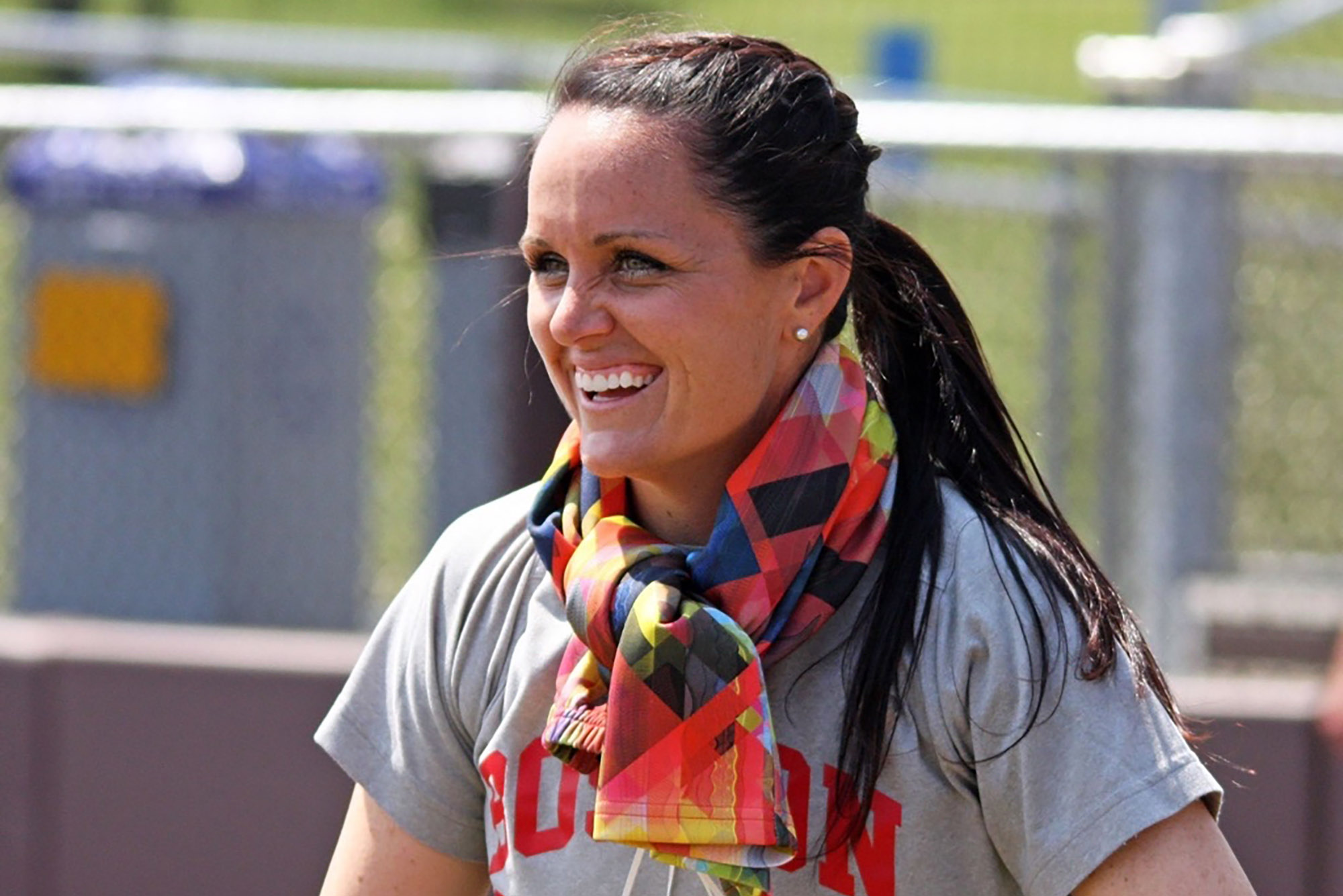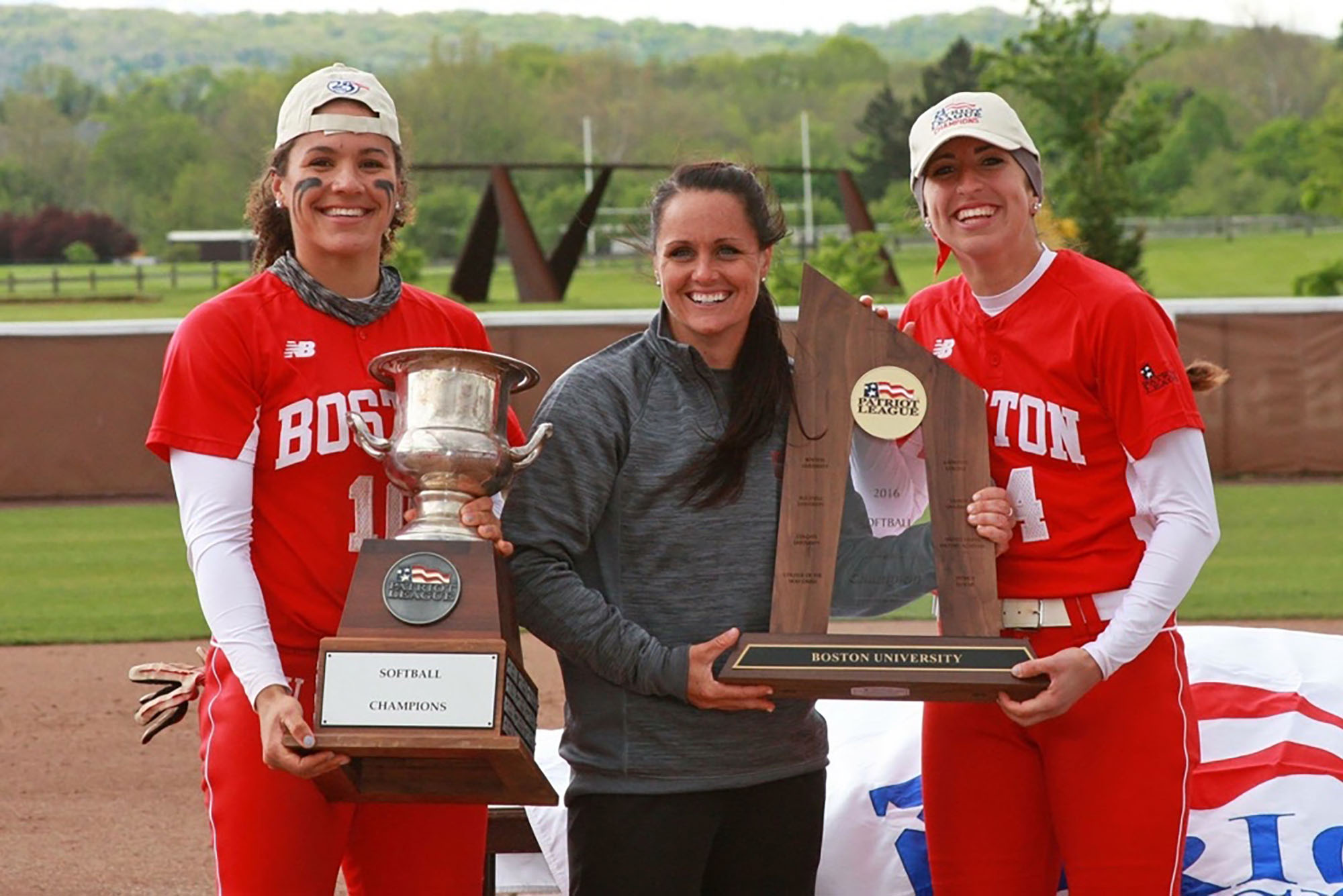Building a Powerhouse: How Ashley Waters Put BU Softball on the Map
After nine years leading the program, wins and titles are no longer a surprise—they’re expected.

Ashley Waters, BU softball head coach, at the 2024 season opener against Binghamton February 9 in Deland, Fla. Waters is the winningest coach in program history, leading the Terriers to five Patriot League titles. Photo by Steve Simoneau, BU Athletics
Building a Powerhouse: How Ashley Waters Put BU Softball on the Map
After nine years leading the program, wins and titles are no longer a surprise—they’re expected
“That’s the pitch you just annihilate.”
Ashley Waters is standing behind a mesh screen with a trolley of softballs at her side. The head coach of the Boston University softball team holds an imaginary bat in her hand, demonstrating the level swing necessary to, in her words, “annihilate” a pitch during batting practice. On this particular Tuesday, the weather is mid-40s with a tide of fog and a generous sprinkle to go with it. Her players, as they had for the entire winter, have moved into the Track & Tennis Center.
Batting tees sit atop worn-down tennis service lines, and pop-flies are hit into a low ceiling often accompanied by a chorus of “Heads up!” The team doesn’t have the luxury of a year-round summer like perennial national championship contenders in the Southeast Conference. During the first month of the season, the Terriers migrate south every weekend to play tournaments in more suitable climates.
All this makes BU’s rise to dominance under Waters that much more impressive.
In her ninth year as BU head coach, Waters has turned the Terriers into nothing short of a Northeast powerhouse, more than capable of competing with some of the heavy hitters nationally, winning five Patriot League titles, four Patriot League Coach of the Year awards, and totting up a record of 298-133. So far this season the Terriers own a 25-3 record, a top-25 ranking nationally, and 10 shutout victories, to name just a few accomplishments. Two of their losses have come in competitive games against Duke and South Carolina, both also top-25 teams.
“Being coached by her is knowing the strength of what women can be,” catcher Audrey Sellers (Sargent’24) says. “She leads with confidence and passion and instills that in all of us, and it’s very inspiring to be coached by her and be loved by her.”
The preeminence of BU under Waters can be traced back to a blanket at a softball field in Amesbury, Mass.

The sport runs through Waters’ blood—her father played baseball, her mother played softball, and both coached. Whether it was watching her mother coach at Amesbury High School or playing in Wiffle ball tournaments her brother organized in the neighborhood, Waters’ childhood revolved around softball.
“My mom used to put me in a blanket with some snacks and hope I wouldn’t get hit with a foul ball,” she says. “I just loved every little thing about the game, and I don’t know, it never went away.”
Her dream from a very young age was to become a Division I softball coach in Massachusetts.
Before picking up the clipboard, however, Waters played middle infield for the University of Maine, earning the America East Player of the Year distinction in 2008, with a .352 batting average, 10 home runs, and 30 RBIs. She continued her career with the semiprofessional Stratford Brakettes for five years before deciding it was time to hang up the cleats and pick up a clipboard.
Jenny Allard, then head coach of Harvard’s softball team, was looking for an assistant, and, impressed with Waters’ energy, hired her in 2012.
“The students really gravitated towards her communication,” Allard says. “When you can really get the best out of your players and command them and motivate them and bring them in, I think that’s one of the traits I really saw in her early.”
Allard doesn’t hesitate to call Waters “one of the most competitive assistants” she’s ever had on staff. It’s a hallmark of Waters, and a fact Waters herself is proud to acknowledge. It’s brought up by every person who knows her.
“If you and I were walking to the mailbox, I want to beat you. I just want to win. Always,” the BU coach says.
If you and I were walking to the mailbox, I want to beat you. I just want to win. Always.
Allard recounts the night in 2015 when she and Waters were working late in the office at Harvard and her assistant coach got a phone call from Boston University, whose team was in search of their seventh head coach after that year’s disappointing campaign. The Terriers had all the pieces, but lacked the person to put them together.
“She brought a fresh perspective because she was newer as a coach, but I don’t think her novelty was reflected in the performance,” says Moriah Connolly (Questrom’17), who played both infield and outfield for the Terriers during Waters’ first two seasons. Connolly notes that Waters’ open communication style and willingness to listen to players established trust early on, a sentiment echoed by today’s players.
“She’s not like any other coach, she gets to know you on a personal level, and she really cares about you as a person, and that’s something special,” Lauren Keleher (Sargent’24) says.
Waters’ coaching style is a pastiche of the influences that preceded her. It’s structured—everything has a purpose. It’s competitive, of course. But most important, it’s fun.
“When you have a chance or an opportunity to watch this team play, you’re going to feel that joy or feel that happiness,” Waters says. “I think that leads to success.”
Connolly recalls a time when her grandma was wearing colorful leggings to a game. Waters bantered with her about it and Connolly’s grandma challenged her to wear the leggings on national television if the team won. Sure enough, during the 2016 NCAA Tournament Regionals, there was Waters with the colorful leggings tied around her neck.

“It’s a testament to that culture, where we won, we’re on a national stage, but she’s still able to have fun and connect with us on a deeper level,” Connolly says. “My grandma to this day talks about how that was one of the greatest moments ever.”
During her first season as head coach, Waters says, her goal was to make the Patriot League tournament. And not only did the Terriers qualify for the playoffs, but they also defeated Army to take home the Patriot League Championship, an immediate program turnaround.
“I never got to experience an NCAA tournament as a player, and that was my first regional experience,” Waters says. “To do it in year one, that’s kind of a start to a fairy tale.”
That fairy tale has lasted for nine years. The team has improved with each passing season, collecting Patriot League titles and accolades to fill a now-overflowing trophy case. The most striking turning point came during their COVID-shortened season. Prior to 2020, the Terriers put up a 58.6 winning percentage—since then, they have won 80.5 percent of games.
“All the alums in my two years, we all joke that we could never go to BU now and play softball because they’re so much better,” Connolly says.
Despite an unequaled regular season in 2022, the Terriers were upset by Lehigh University in the Patriot League championship game. As Waters puts it, this led to a “revenge tour” mindset in 2023. The Terriers went on to a dominant 52-10 record, setting a program and conference record, taking home the Patriot League regular season title for the fifth straight season and then the league championship, and winning the most games by a Northeast school in a season since 2002.
This season, Waters is setting out to prove last season wasn’t just historic.
“Anytime you call something historic, that means it’s rare, it doesn’t happen a lot,” Waters says. “We believe that title is ours and it’s our job to defend it and it’s our job to own it, so this year we’re just trying to run it back.

“I don’t care who we’re playing. I do not fear losing, I fear not competing,” she says. “If we go against the best in the country and we compete, in my mind, that’s a win.”
Their pitching core of Alison Boaz (ENG’24), Lizzy Avery (ENG’24), and Kasey Ricard (Sargent’26) owns a 1.64 ERA, a top-10 mark in the nation. Meanwhile, their top bats, Kayla Roncin (Sargent’24), Keleher, Caitlin Coker (CAS’24), and Avery, to name a few, have helped score an average of over six runs per game.
“Before coming here, this was a great squad, but I think being here and seeing the classes that have transitioned through, we’re the best we’ve ever been,” Sellers says. “That says a lot considering the talent we’ve had in the past.”
Last fall, Waters signed a multiyear extension to stay at BU. When asked why, she says, simply: “I feel at home here.”
The BU softball team is transitioning into another echelon—one where trophies aren’t chased, but expected. The Terriers are no longer a scrappy underdog, but are setting a standard for what it means to wear “Boston” across their chest.
“I wanted to make BU relevant. I wanted to make BU a team to beat. I wanted to put us on the map,” Waters says. “I don’t need to go somewhere else for that. We’re doing that here.”
Comments & Discussion
Boston University moderates comments to facilitate an informed, substantive, civil conversation. Abusive, profane, self-promotional, misleading, incoherent or off-topic comments will be rejected. Moderators are staffed during regular business hours (EST) and can only accept comments written in English. Statistics or facts must include a citation or a link to the citation.